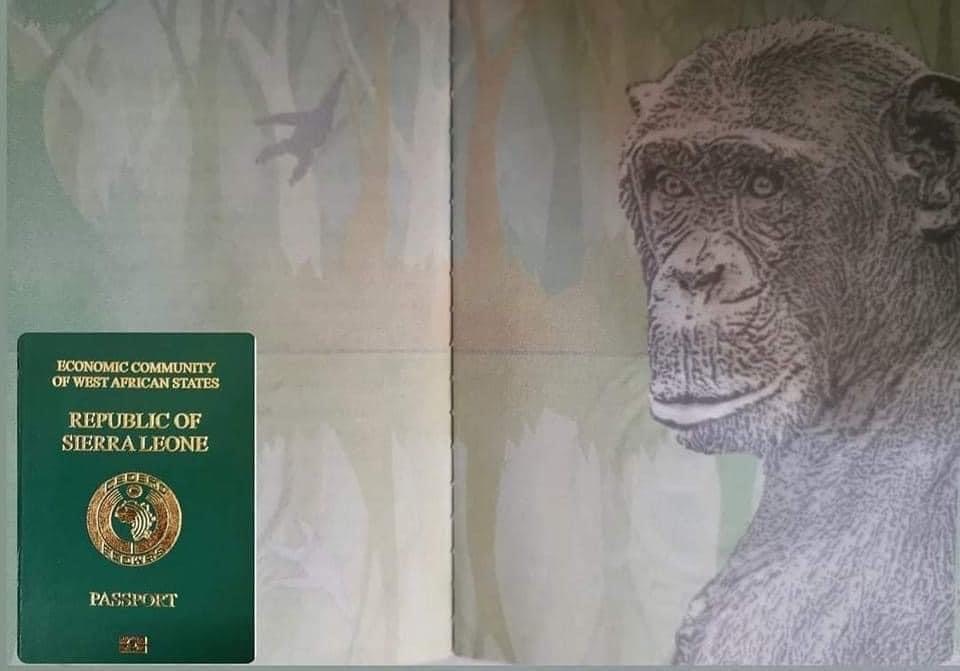It has been a chimpy week in the land. So, we thought we could weigh in because this chimp-passport debate has been so loud with a hint of misdirected energy. We are not going to dwell on the fact that there is a chimp or “baboo” on the pages of our passports. If the designers had done a good job with the artwork and layout, we wouldn’t be having this debate over chimps. Or perhaps, it is an opportunity to talk and learn about chimps and their place in our biodiversity. If there is “no bad publicity”, then the chimpanzees are having the time of their lives. This is the biggest chimp conversation since Bruno. We do not want to dismiss the concerns and preferences of the anti-chimpers, but to redirect the conversation to the real issues around the Sierra Leone passport.
To start with, our passport is expensive! And the fact that it is pegged to the US dollar means the cost keeps going up as the Leone depreciates in a freefall. It can be argued that as the Leone loses value, the cost of doing business increases. And when that happens, the cost is transferred to the end user. Well, we have a situation where most people are poor and obtaining a passport, for many people, is necessitated by the need to travel. People do not ordinarily show up at immigration to get a passport unless they have serious travel plans. And for some, it takes a lot of contributions and family meetings to pay for a passport to go look for greener pastures, trading and commerce or education and professional development. A hundred US dollars’ equivalent is a lot for a passport and frankly, you end up paying a lot more than that because the system does not work. Backchannels and middle-people make the cost much higher. A State that really cares would find ways to cushion the impact on its people, especially when the cost of everything is getting higher and beyond the reach of the average person. A passport must not be a luxury but sadly, it is.
For those who can afford it, getting the passport presents a fresh episode of headache. First of all, the chaos at Immigration makes it hard to know where to start and end. And without brokers, whom you have to “give something” to help you, you should be prepared to spend days going through the process and weeks waiting for it to be ready for collection. For a population as small as ours, you wonder why some of these services have not been fully digitized to make the process pain-free and efficient. Some would argue that the process has improved a lot over time, but when you hear that, you really begin to appreciate the scale of the problem and how far behind we are. If you have to pay US$100 for a travel document that you are entitled to, at least make the process efficient. Invest in it. What we have now is a marriage between political and corporate powers—a government that is in bed with a contractor that is profiting from the passport business. They certainly are not making a loss.
Adding to the fact that the passport is expensive and getting one is painstaking, you have to deal with the nightmare of having to come back to Immigration every five years to get a new passport. And if you are a frequent traveller (you don’t even have to be in the same league as Di Pa), it is even worse because the number of pages just doesn’t make sense. Passports are generally biometric these days. So, there is no point in giving a five-year validity. Ten years is a reasonable period, especially when the process of getting the passport is nothing close to smooth. Government officials and their supporters are quick to make comparisons to other countries when unhappy citizens raise valid concerns over governance issues that impact their lives. Let us make a few comparisons to demonstrate why we have been given a raw deal by this passport contractor and the government. On the higher side, Ghanaians pay the equivalent of US$110 for a 10-year validity with 48 pages. Kenyans pay the equivalent of 40 US dollars for a 34 page passport with a validity of 10 years. They pay US$ 55 for a 66 page passport that’s also valid for 10 years. It is a shame that even with a new passport, Sierra Leone has not matched some of its ECOWAS counterparts in the number of pages and period of validity of the passport.
The issues highlighted above are what we think the real issues are around the passport and we must direct our energy and outrage towards these issues that have implications on people’s finances, and ability to get a passport and travel. These days, many small businesses and start-up owners are traveling to do business. Many young people get opportunities to develop their skills and network with their counterparts abroad. We cannot make a passport a barrier or an avenue for exploitation. Issuing passports should never be a business that is for profit. It is a service that the State needs to provide. Exorbitant charges, complicated and inefficient processes defeat the purpose.
Whatever you are up to this weekend, make time to head to Tacugama and see the chimps. But in this Bio-nomics, the opportunity to see and learn about chimpanzees could also be a luxury for many.


